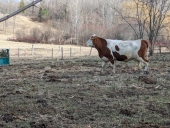
 1
1




Maybe Life is always like being on a trapeze or a tightrope at the circus...
 14
14











 5
5




I am only one, but still I am one. I cannot do everything, but still I can do something; and because I cannot do everything, I will not refuse to do something that I can do. (E.E.Hale)
 8
8




 12
12




Hello, please call me Mouse. Talk to me about rabbits, chickens, and gardens. Starting an intentional community in Ohio.
http://quarteracrehome.wordpress.com
https://www.etsy.com/shop/HomeAndHedgewitch
https://www.instagram.com/wren_ohio/

 13
13











 3
3




Maybe Life is always like being on a trapeze or a tightrope at the circus...
 10
10











 6
6




I am only one, but still I am one. I cannot do everything, but still I can do something; and because I cannot do everything, I will not refuse to do something that I can do. (E.E.Hale)
 11
11




"The only thing...more expensive than education is ignorance."~Ben Franklin
"We can easily forgive a child who is afraid of the dark; the real tragedy of life is when men are afraid of the light." ~ Plato
 3
3




r ranson wrote:There is a lot of "information" out there on this topic. Much of this information comes from people who have never met a cow. The internet is very lopsided on this topic because most people raising animals are too busy to post opinions online. You're lucky you caught me on a week where I'm dedicated to answering questions on permies otherwise I would be out there with my sheep.
If you have concerns, the best thing you can do is to find a local farm and visit. See for YOURSELF if the farming practices meet your ethics.
Maybe Life is always like being on a trapeze or a tightrope at the circus...
 1
1




Carla Burke wrote:we buy our whole, raw milk directly from a local Mennonite farmer, and draw it directly from his chill tanks, ourselves, just hours after it's pulled. We get to see the grass-fed, pastured cows, pet them, if they're close, and ask all the question we want. I truly wish everyone could do the same!
Maybe Life is always like being on a trapeze or a tightrope at the circus...
 4
4




"The only thing...more expensive than education is ignorance."~Ben Franklin
"We can easily forgive a child who is afraid of the dark; the real tragedy of life is when men are afraid of the light." ~ Plato
 3
3




Carla Burke wrote:Just remember to check your state laws, before you even try to find a farmer, or you may end up wasting the time you spent searching for the farmer. Being as closer to the border as you are, you have a couple states to look into.
My husband turned cheese and yogurt making into a hobby, as well as mead & ales. Then again, we're retired, so convenience has lost a lot of its necessity, for us.
Maybe Life is always like being on a trapeze or a tightrope at the circus...
 5
5




r ranson wrote:
Again, the mythology that mumma animals can only produce a tiny amount of milk - just barely enough to feed their young - doesn't hold up when you look at actual mammals.
I don't understand where that myth came from. I wish it would stop coming back.
 3
3




Hello, please call me Mouse. Talk to me about rabbits, chickens, and gardens. Starting an intentional community in Ohio.
http://quarteracrehome.wordpress.com
https://www.etsy.com/shop/HomeAndHedgewitch
https://www.instagram.com/wren_ohio/


 3
3




Hans Albert Quistorff, LMT projects on permies Hans Massage Qberry Farm magnet therapy gmail hquistorff







 5
5




Hans Albert Quistorff, LMT projects on permies Hans Massage Qberry Farm magnet therapy gmail hquistorff
 3
3




Hans Quistorff wrote:You are in a good place according to Google search. food co-ops near you some have a storefront, some have pickup sites, some make deliveries.
Maybe Life is always like being on a trapeze or a tightrope at the circus...
 2
2




 2
2




 2
2




Invasive plants are Earth's way of insisting we notice her medicines. Stephen Herrod Buhner
Everyone learns what works by learning what doesn't work. Stephen Herrod Buhner
 2
2





|
Squanch that. And squanch this tiny ad:
Learn Permaculture through a little hard work
https://wheaton-labs.com/bootcamp
|

